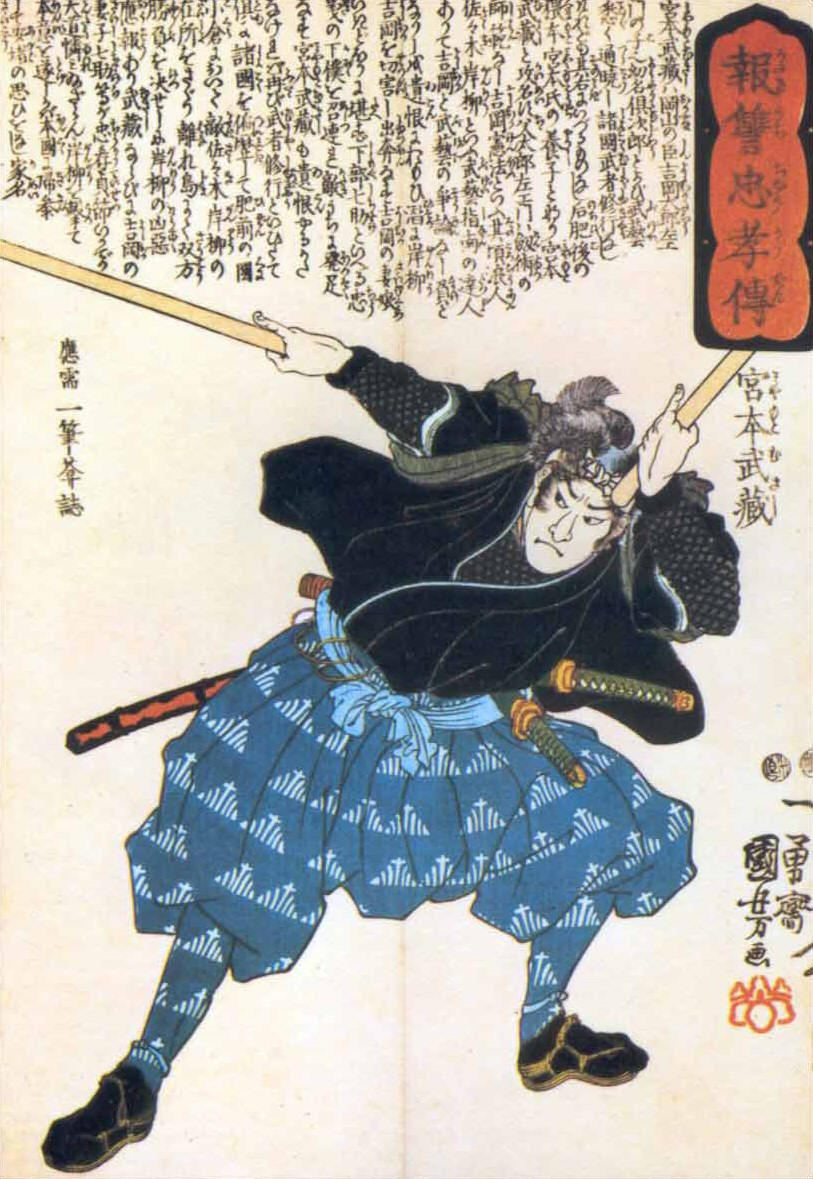The Book of Five Rings by Myamoto Musashi
Book Extracts
Considered a classic by modern martial artists, the book of 5 rings extends far beyond the art of fighting and into the realms of the transcendental.

Miyamoto Musashi in his prime, wielding two bokken (wooden quarterstaves). Color version to replace B&W. Scan of ancient japanese scroll
Miyamoto Musashi was born in 1584, in a Japan struggling to recover from more than four centuries of internal strife. The traditional rule of the emperors had been overthrown in the twelfth century, and although each successive emperor remained the figurehead of Japan, his powers were very much reduced. Since that tie, Japan had seen almost continuous civil war between the provincial lords, warrior monks and brigands, all fighting each other for land and power.
… To sum up, Musashi was a ronin at a time when the samurai were formally considered to be the elite, but actually had no means of livelihood unless they owned lands and castles. Many ronin put up their swords and became artisans, but others, like Musashi, pursued the ideal of the warrior searching for enlightenment through the perilous paths of Kendo. Duels of revenge and tests of skill were commonplace, and fencing schools multiplied. Two schools especially, the Itto school and the Yagyu school, were sponsored by the Tokugawas. The Itto school provided an unbroken line of Kendo teachers, and the Yagyu school eventually became the secret police of the Tokugawa bureaucracy.
(from the introduction)
The Book of Five Rings by Myamoto Musashi
The Way is shown as five books concerning different aspects. These are Ground, Water, Fire, Tradition (Wind), and Void.
The body of the Way of strategy from the view-point of my Ichi school is explained in the Ground book. It is difficult to realise the true Way just through sword-fencing. Know the smallest things and the biggest things, the shallowest things and the deepest things. As if it were a straight road mapped out on the ground, the first book is called the Ground book.
Second is the Water book. With water as the basis, the spirit becomes like water. Water adopts the shape of its receptacle, it is sometimes a trickle and sometimes a wild sea. Water has a clear blue colour. by the clarity, things of Ichi school are shown in this book.
If you master the principles of sword-fencing, when you freely beat one man, you beat any man in the world. The spirit of defeating a man is the same for ten million men. The strategist makes small things into big things, like building a great Buddha from a one foot model. I cannot write in detail how this is done. The principle of strategy is having one thing, to know ten thousand things. Things of the Ichi school are written in this, the Water book.
Third is the Fire book. This book is about fighting. The spirit of fire is fierce, whether the fire be small or big; and so it is with battles. The Way of battles is the same for man to man fights and for ten thousand a side battles. You must appreciate that spirit can become big or small. What is big is easy to perceive: what is small is difficult to perceive. In short, it is difficult for large numbers of men to change position, so their movements can be easily predicted. An individual can easily change his mind, so his movements are difficult to predict. You must appreciate this. The essence of this book is that you must train day and night in order to make quick decisions. In strategy it is necessary to treat training as a part of normal life with your spirit unchanging. Thus combat in battle is described in the Fire book.
Fourthly the Wind book. This book is not concerned with my Ichi school but with other schools of strategy. By Wind I mean old traditions, present-day traditions, and family traditions of strategy. Thus I clearly explain the strategies of the world. This is tradition. It is difficult to know yourself if you do not know others. To all Ways there are side-tracks. If you study a Way daily, and your spirit diverges, you may think you are obeying a good Way but objectively it is not the true Way. If you are following the true Way and diverge a little, this will later become a large divergence. You must realise this. Other strategies have come to be thought of as mere sword-fencing, and it is not unreasonable that this should be so. The benefit of my strategy, although it includes sword-fencing, lies in a separate principle. I have explained what is commonly meant by strategy in other schools in the Tradition (Wind) book.
Fifthly, the book of the Void. By Void I mean that which has no beginning and no end. Attaining this principle means not attaining the principle. The Way of strategy is the Way of nature. When you appreciate the power of nature, knowing the rhythm of any situation, you will be able to hit the enemy naturally and strike naturally. All this is the Way of the Void. I intend to show how to follow the true Way according to nature in the book of the Void.
(A Book of Five Rings by Miyamoto Musashi, pub. Allison and Busby Ltd 1974)
……………………………………




